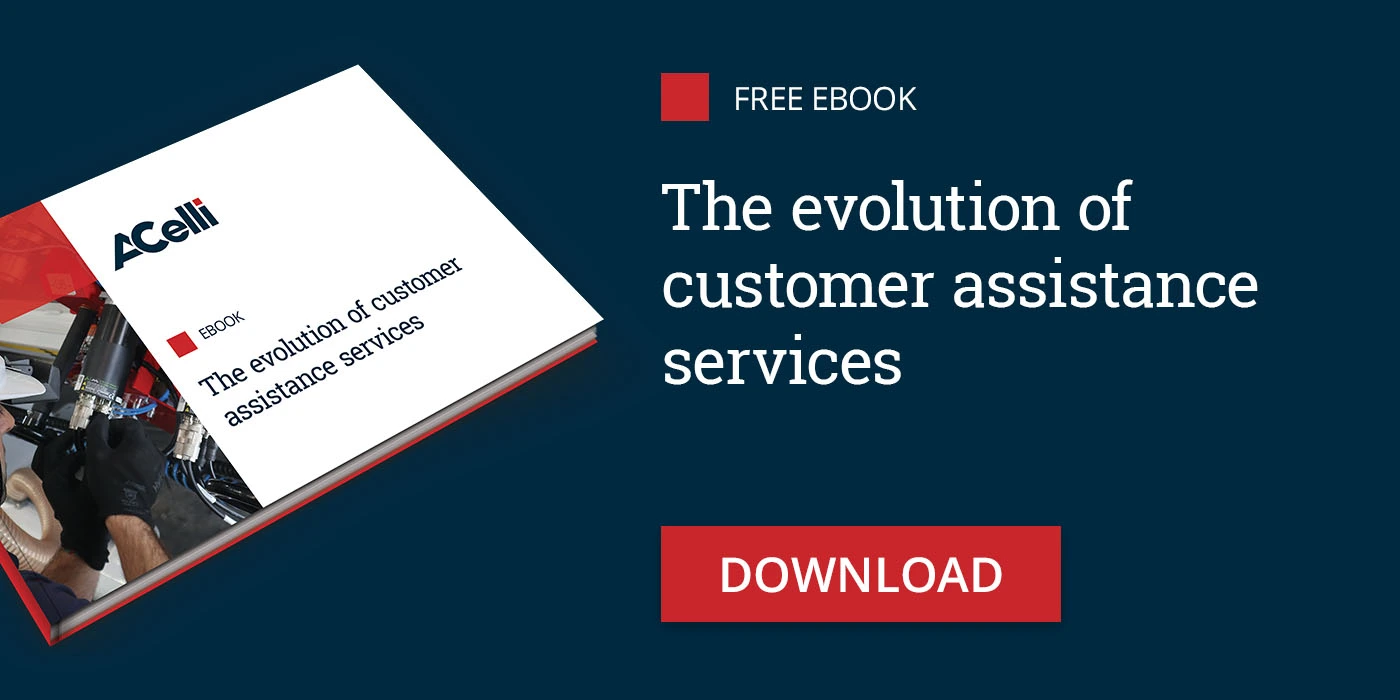In addition to the quality of the machinery offered, a manufacturer is also appreciated, and perhaps above all, for its ability to provide valid assistance to its customers.
And this does not only mean quickly solving a problem in the event of a breakdown, although it is a strategic aspect, but also providing valid help throughout the entire life cycle of a machine to keep it at peak efficiencty.
Beyond the sale
The quality and reliability of the machines are certainly points of pride for every manufacturer. However, today more than ever, in the face of increasingly aggressive competition and a highly unstable economic situation, a manufacturer demonstrates its true value as a supplier by not abandoning the customer after the sale, providing assistance and support as quickly and effectively as possible.
Starting from the implementation phase, the manufacturer should assist the customer when necessary to resolve any doubts and offer all the necessary tools to allow them to use the machinery to the fullest in order to maximize efficiency and productivity.
Having purchased reliable and high-performance machines is essential. However, a malfunction can always occur, and it is on that occasion that the manufacturer must be able to limit the damage for customers by intervening quickly and competently.
The sale is only the first step in a long-lasting business relationship. It is up to the manufacturer to be able to maintain it.
The evolution of customer service
Historically, a customer service could only be contacted by phone, with endless waiting times and outcomes that were not always up to expectations.
Today, digital transformation and mobile devices have accustomed people to be able to have immediate feedback to their requests using different communication channels, such as the internet, social media, and WhatsApp instant messaging. Being these tools always available, customers expect non-stop assistance that can provide quick answers to problems.
In light of these demands, in the era of Industry 4.0, manufacturers must ensure the availability of spare parts for their products, maximize the efficiency of their services and, above all, improve customer experience. To achieve this result we use more and more frequently tools like the digital experience platform (DXP), a software designed to help companies offer a better user experience, thus increasing customer satisfaction.
A DXP can consist of a single application or a suite of programs to allow companies to provide the best service possible. Increasingly, a DXP also integrates Artificial Intelligence: by analyzing data obtained through customer feedback on products and services, it is possible to obtain useful indications to further improve the customer experience from a self-service perspective and with a greater personalization of the services themselves. This outlines a customer assistance that is increasingly aligned with the needs of the individual customer.
Constant assistance
For a customer, assistance is a service that we could define as "latent": it's there but you can't see it. But when it's needed, the supplier must always be ready and available to quickly solve problems.
This is particularly true in the paper, tissue paper, and nonwoven industry, where a reduction in the efficiency of a machine can result in significant financial losses, not to mention the production line shutdown caused by a sudden breakdown.
In this sense, a high-quality assistance service must first make use of a team of competent and experienced people who are able, if possible, to provide decisive answers already at a first remote contact, if the problem were to be of a minor nature. If, on the other hand, an on-site intervention were necessary, it becomes essential to be structured in order to be able to act in the shortest possible time.
A crucial role is played by the spare parts warehouse, which must be designed to always have available the materials most subject to wear, for which replacement is more frequently requested, and the components considered critical for the correct functioning of the machinery.
This results in the possibility of immediately starting the intervention procedure, thereby minimizing the problem resolution times. This is a significant aspect in a situation like the current one, in which it can take months to get a spare part from a manufacturer.
Current and future customers
A long-lasting business relationship is based first and foremost on trust and continuous support, but not only. Providing assistance does not only mean intervening reactively when a problem arises. It also means keeping the machinery in top condition so that it can always offer the best performance.
In other words, providing assistance means prolonging the life of the machines through periodic updates, especially with regard to software, or offering upgrades that allow for the improvement of the machines' functionality and performance. On older plants, it is then possible to carry out retrofit interventions to replace existing parts with the aim of improving the characteristics of the machine or device, such as its performance or the safety of the operators.
It should not be forgotten that in the case of nonwoven industry, the average lifespan of a machine is around 20 years: a time frame in which, at current development rates, technology is making giant strides. A manufacturer like A.Celli, attentive to the needs of its customers, thanks to the retrofit interventions offered, is able to bring improvements to plants that have been active for years and are still in good condition.
A more "radical" modernization intervention can then be that of rebuilding, which consists in dismantling an old machine and building a new one in its place. The functions are the same, but performance and efficiency are drastically improved.
The importance of training
To all of this, A.Celli also adds the Academy: a service through which the company organizes training programs for technicians and line operators.
The courses, customizable according to the customer's needs, are held by A.Celli specialists and focus on identifying solutions on the field and practical demonstrations, presenting everyday problem-solving techniques and best practices in the industry.
The goal is to provide a thorough understanding of the plants and the numerous industrial processes, both to independently solve those problems that do not require the intervention of a technician on site but can cause production blockages, and to perfectly know the operation of the machinery, thus making it possible to obtain and maintain optimal performance. Finally, through its Academy A.Celli also makes available numerous educational materials that can be useful for improving efficiency and productivity of the machines.

